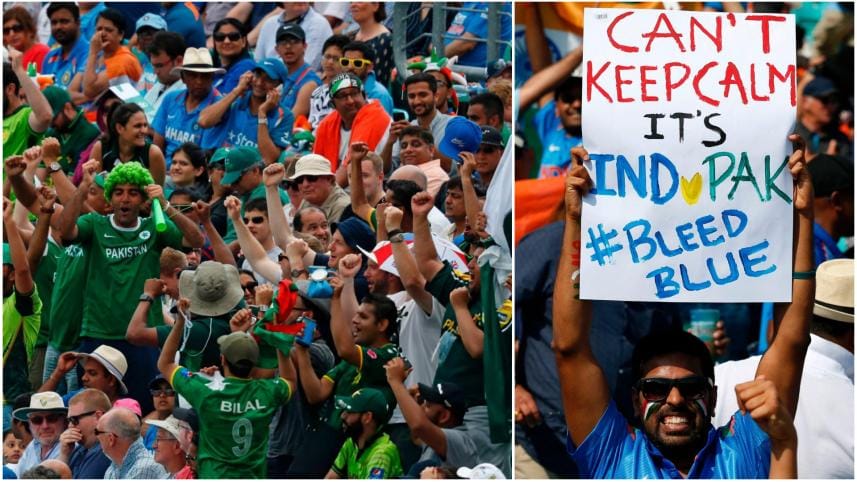IND v PAK: A rivalry that goes way beyond cricket

When the Prime Minister of a nation makes a serious statement about sports, it is clear that the underlying causes go beyond the game itself -- that the tension arises from something much larger on a broader scale.
"The real challenge now is not only to secure the Champions Trophy but also to defeat our archrivals, India. The entire nation stands firmly behind them," Pakistan Prime Minister Shehbaz Sharif said a few days before the start of the Champions Trophy 2025.
The statement from Pakistan's premier might sound like a request usually heard from the fans of the two neighbouring countries who detest even the notion of a defeat against each other.
But nothing that concerns India and Pakistan is ever only about the matter at hand -- in this instance, cricket. In fact, cricket, often seen as a potential bridge to bring the two nations closer despite their many differences, has been intertwined with politics for decades.
Even long before the cricketers of the two bordering countries step onto the field, it sends the cricketing world into a frenzy. It ceases to be just about the battle between Imran Khan and Kapil Dev, Shoaib Akhtar's searing pace against Sachin Tendulkar's elegance, the two Ws (Wasim Akram and Waqar Younis) versus the long and celebrated Indian batting lineup, or the modern-day comparisons of Virat Kohli and Babar Azam. The excitement and anticipation seep into the souls of players, fans, and stakeholders across these cricket-obsessed nations.
The real challenge now is not only to secure the Champions Trophy but also to defeat our archrivals, India. The entire nation stands firmly behind them.
However, the rivalry's darker side often escalates into mob violence and militant activities -- the Board of Control for Cricket in India (BCCI) bore the brunt of it when a group of militants attacked their Bombay headquarters in 1999, just days before Pakistan were scheduled for their first Test tour of India in 12 years. Among the damages was the 1983 World Cup trophy, the first ever won by Kapil Dev's men.
That Pakistan tour went ahead as both the Pakistan Cricket Board (PCB) and BCCI deemed it prudent to ensure that cricket was not harmed by external factors.
It was such bold stances that made Virender Sehwag the 'Sultan of Multan' during India's first tour of Pakistan in 15 years back in 2004 -- a tour that took place under what then PCB CEO Ramiz Raja described as the most extensive security measures ever seen at a sporting event.
Things, however, changed drastically post-November 2009. The horrific Mumbai attacks that took place during that time had connections to a Pakistani extremist group, prompting the Indian government to take a rigid stance against sending any of their national teams to Pakistan.
Hence, it was no surprise that questions arose about whether India would travel to Pakistan as soon as the latter was announced as the sole host for the Champions Trophy back in November 2021.
For Pakistan, securing the hosting rights of a major ICC event for the first time since the 1996 World Cup -- co-hosted with India and Sri Lanka -- was only the beginning of a long negotiation process. Talks stretched on for months, with the fate of the entire tournament hanging in the balance until just two months before its scheduled start.
While India ended up getting what they wanted, playing all of their matches at a neutral venue in Dubai, the PCB also secured some ground in the negotiations. Pakistan will still host at least 12 of the 15 Champions Trophy matches across its three designated venues -- Karachi, Rawalpindi, and Lahore -- except, of course, for those involving India.
The recent resolution, mediated by the ICC, includes an agreement between the two boards stating that both India and Pakistan will play in neutral venues for any tournaments hosted by either nation in the 2024-2027 event cycle.
Unfortunately, amid all this, the biggest casualty has been cricket itself. Playing all their matches in Dubai, India will stand to benefit in terms of reduced travel. While the cricket's governing body curates pitches in ICC events, the conditions of the UAE and the three different venues in Pakistan might require significant adaptations from the teams travelling between these venues.
The same will apply to Pakistan during the 2025 Women's ODI World Cup in India and the 2026 Men's T20 World Cup, co-hosted by India and Sri Lanka.
For now, this resolution appears to be the only way to make these politically strained rivals agree on something, even if it comes at the expense of the quality of cricket and ICC events.
The history, the politics, and the uproar seem destined to continue, but at least the next phase of it will have cricket in store. On February 23, one of the most-watched sporting events in history will unfold at the Dubai International Cricket Stadium, as defending champions Pakistan take on India finally after so many phases of negotiations and years of unending tensions.




 For all latest news, follow The Daily Star's Google News channel.
For all latest news, follow The Daily Star's Google News channel.
Comments